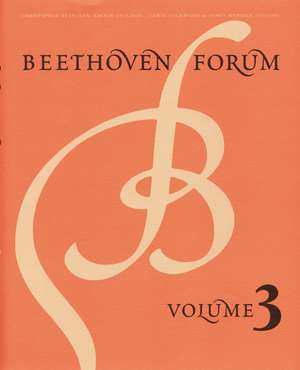Beethoven Forum, Volume 3: Beethoven Forum
Autor Beethoven Forum Editat de Glenn Stanleyen Limba Engleză Hardback – 27 mar 1995
The opening essay by James Webster, "Beethoven in Vienna, 1792-1802: An 'Early' Period?", evaluates the critical tradition of dividing Beethoven’s career into three periods—early, middle, and late—and shows both their artificiality and their implications, including a tendency to undervalue early works. Jürgen May’s essay "Beethoven and Prince Karl Lichnowsky," considers Beethoven’s relations with one of the first of his most important patrons.
In "Beethoven before 1800: The Mozart Legacy," Lewis Lockwood examines Beethoven’s sketchbooks to describe how Beethoven composed with and against models from Mozart. Glenn Stanley's essay, "The 'wirklich gantz neue Mainer' and the Path to It: Beethoven's Variations for Piano, 1783-1802," surveys Beethoven’s sets of piano variations written in his first decade in Vienna and argues the importance of the variations in Beethoven's progress as a composer.
In 'Pathos and the Pathétique," Elaine R. Sisman provides a historical and aesthetic analysis of one of Beethoven’s most popular piano sonatas. The composition of one of Beethoven's most popular violin sonatas, the "Spring" sonata is traced in the sketchbooks by Carl Schachter in "The Sketches of the Sonata for Piano and Violin, Op. 24."
Nicholas Marston's "Stylistic Advance, Strategic Retreat: Beethoven's Sketches for the Finale," also pays precise attention to Beethoven's sketches to discover how the composition of the Second Symphony illuminates Beethoven's work on an "underlying idea." In "Hybrid Themes: Toward a Refinement in the Classification of Classical Theme Types," William E. Caplin defines "hybrid themes" and shows their variety in Beethoven’s early compositions.
William Kinderman concludes the volume with a review article on Klaus Kropfinger’s Wagner and Beethoven and its study of the "battle for Beethoven" that racked nineteenth-century European music.
In 'Pathos and the Pathétique," Elaine R. Sisman provides a historical and aesthetic analysis of one of Beethoven’s most popular piano sonatas. The composition of one of Beethoven's most popular violin sonatas, the "Spring" sonata is traced in the sketchbooks by Carl Schachter in "The Sketches of the Sonata for Piano and Violin, Op. 24."
Nicholas Marston's "Stylistic Advance, Strategic Retreat: Beethoven's Sketches for the Finale," also pays precise attention to Beethoven's sketches to discover how the composition of the Second Symphony illuminates Beethoven's work on an "underlying idea." In "Hybrid Themes: Toward a Refinement in the Classification of Classical Theme Types," William E. Caplin defines "hybrid themes" and shows their variety in Beethoven’s early compositions.
William Kinderman concludes the volume with a review article on Klaus Kropfinger’s Wagner and Beethoven and its study of the "battle for Beethoven" that racked nineteenth-century European music.
Preț: 498.13 lei
Preț vechi: 541.44 lei
-8% Nou
Puncte Express: 747
Preț estimativ în valută:
95.31€ • 99.79$ • 78.87£
95.31€ • 99.79$ • 78.87£
Cartea se retipărește
Doresc să fiu notificat când acest titlu va fi disponibil:
Se trimite...
Preluare comenzi: 021 569.72.76
Specificații
ISBN-13: 9780803242463
ISBN-10: 0803242468
Pagini: 189
Dimensiuni: 216 x 260 mm
Greutate: 0.82 kg
Editura: UNP - Nebraska
Colecția University of Nebraska Press
Seria Beethoven Forum
ISBN-10: 0803242468
Pagini: 189
Dimensiuni: 216 x 260 mm
Greutate: 0.82 kg
Editura: UNP - Nebraska
Colecția University of Nebraska Press
Seria Beethoven Forum
Notă biografică
This volume is guest edited by Glenn Stanley, who organized the 1993 conference, Beethoven in Vienna 1792-1803: the First Style Period where these essays were first presented and discussed.
Christopher Reynolds is a professor and chair of the Department of Music at the University of California at Davis. His articles have appeared in Journal of the American Musicological Society, Nineteenth-Century Music, and Early Music History. Lewis Lockwood is Fanny Peabody Proessor of Music at Harvard University. He is the recipient of the Einstein, Kinkeldey, and Marraro prizes and author of Beethoven: Studies in the Creative Process, and Music in Renaissance Ferrara. James Webster is a professor of music at Cornell University. He received the Kinkeldey award for his book, Haydn's "Farewell" Symphony and the Idea of Classical Style.

